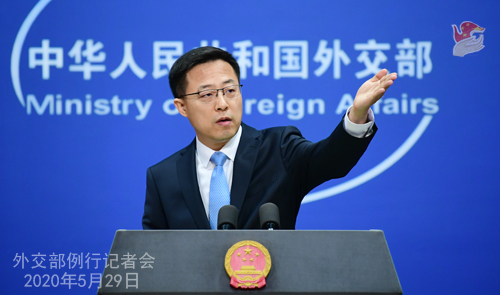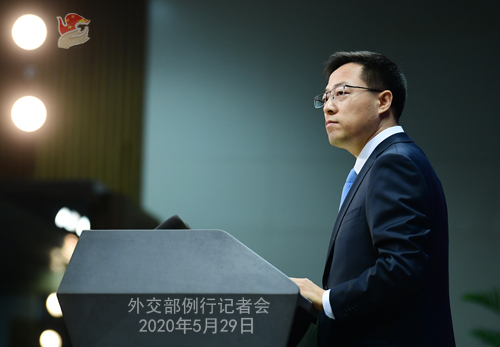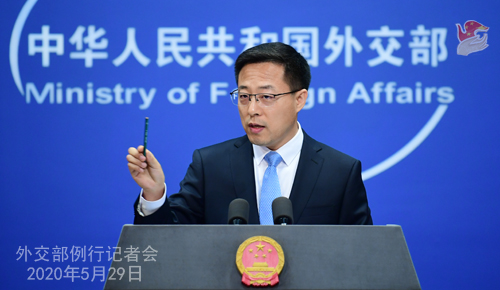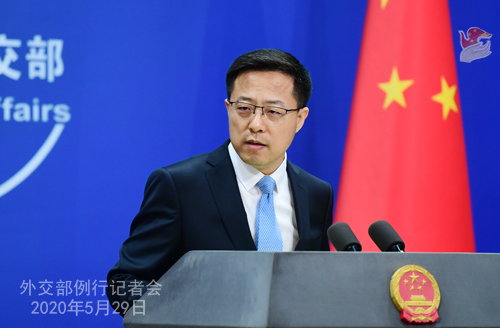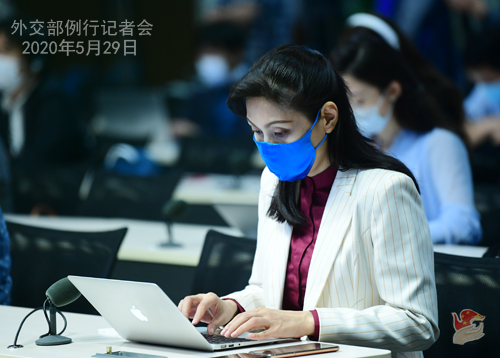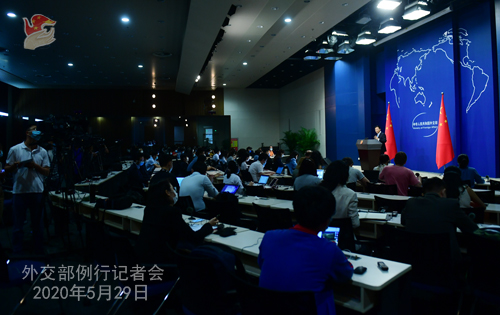| Foreign Ministry Spokesperson Zhao Lijian's Regular Press Conference on May 29, 2020 |
| 2020-05-29 23:50 |
|
CCTV: According to reports, the US has asked the UN Security Council to hold a video conference on the national security legislation for Hong Kong on the ground that it harms the region's high degree of autonomy and freedoms and bears on international peace and security. Do you have a response? Zhao Lijian: What the US side is doing is purely nonsense. China's stance and position has been made more than clear on this issue. I want to stress again that Hong Kong is a special administrative region of China and a sub-national administrative region directly under the Central People's Government of China. Establishing and improving at the national level a legal system and enforcement mechanisms for safeguarding national security in the HKSAR is aimed to safeguard national sovereignty, security and development interests, and to ensure the steady and sustained implementation of "one country, two systems". This matter is China's internal affair and no foreign country has any right to interfere with it. As is known to all, the UN Security Council bears the responsibility to maintain world peace and stability. Apparently this legislative issue concerning Hong Kong does not fall within its mandated scope of duty. Besides, non-interference in other's internal affairs is an important principle of the UN Charter and a basic norm of international relations. By asking the Security Council to discuss the issue, the US is blatantly interfering in China's domestic affairs and trampling on basic norms governing international relations. Naturally China is firmly opposed to it. And the US attempt will by no means succeed. The Security Council is not a tool at the disposal of the US. China and all member states upholding justice will not allow the US to take the Security Council hostage for its own political purposes. People have fair judgments. Between China and the US, it is only too evident which side is upholding multilateralism and supporting the UN as a responsible member state. We urge the US side to immediately stop such frivolous political manipulation and instead do something useful for the international community. China Review News Agency: On May 27, US Secretary of State Mike Pompeo said in a statement that China imposed national security legislation on Hong Kong, which undermined Hong Kong's autonomy and freedoms. He certified to Congress that Hong Kong does not continue to warrant treatment under US laws in the same manner as US laws were applied to Hong Kong before July 1997. Do you have any comment? Zhao Lijian: The decision of the National People's Congress to establish and improve a legal framework and enforcement mechanisms for safeguarding national security in the HKSAR is totally China's internal affair and there is no place for any foreign interference. Pompeo even flatters himself by tweeting "we stand with the people of Hong Kong". But isn't he standing with those "Hong Kong independence" separatists and violent elements? Pompeo's remarks entirely run against basic norms governing international relations and severely interfere in China's internal affairs. We deplore and firmly oppose that. National security is the basic foundation for the existence and development of any country in the world. The Hong Kong-related national security legislation targets a very small number of "Hong Kong independence" separatists and violent elements. It safeguards the lawful rights, interests and freedoms of Hong Kong residents. No state will allow separatist and other activities that endanger its national security on its own territory. The Chinese government is firm in its determination to safeguard China's sovereignty, security and development interests, to implement the principle of "one country, two systems" and to oppose any external interference in Hong Kong affairs. We urge the US to immediately rectify its mistake, stop interfering in China's internal affairs and refrain from going further down the wrong path. Any act to undermine or obstruct the NPC's Hong Kong-related legislation is doomed to fail like kicking against the pricks. China Daily: Statement from the foreign ministers of the UK, Australia, Canada and the US said that the NPC's decision to adopt the national security law on Hong Kong lies in direct conflict with China's international obligations under the principles of the Sino-British Joint Declaration and would undermine the "one country, two systems" framework. What is your comment? Zhao Lijian: As I said, the NPC's decision to establish and improve a legal system and enforcement mechanisms on upholding national security for the HKSAR is China's internal affair that allows no external interference. The unwarranted comments and accusations made by the relevant countries constitute a flagrant interference in Hong Kong affairs and China's internal affairs. China deplores and firmly opposes that and has made stern representations with the relevant countries. In all countries, unitary and federal alike, only the State legislature has the legislative power on issues concerning national security. The Central Government is responsible for upholding national security in China, as is the case in any other country. I don't think you can find one country that will allow activities endangering national security to take place on its territory. As China resumed sovereignty over Hong Kong in 1997, the rights and obligations of the British side under the Sino-British Joint Declaration were completely fulfilled. And the Chinese government started administering it, in accordance with the Constitution and the Basic Law, not the Joint Declaration. The relevant countries have no legal basis or any right to cite the Joint Declaration to point fingers at Hong Kong affairs. Hong Kong is China's Hong Kong. No one cares more about Hong Kong's prosperity and development and Hong Kong residents' welfare than the Central Government. No one is more determined than the Central Government to fully and faithfully implement the principle of "one country, two systems" and the Basic Law. We urge the relevant countries to respect China's sovereignty, abide by international law and basic norms for international relations, be discreet with their words and deeds, stop interfering in Hong Kong affairs and China's internal affairs, and do more to promote Hong Kong's prosperity and stability and their bilateral relations with China.
China News Service: US Secretary of State Michael Pompeo announced in a statement on May 28 Beijing time the end of sanctions waiver covering nuclear projects in Iran including the Arak reactor conversion following a final, 60-day wind-down period. I wonder if China has a comment? Zhao Lijian: The Joint Comprehensive Plan of Action (JCPOA), a multilateral agreement endorsed by UN Security Council Resolution 2231, is an important component of the international non-proliferation regime and is essential to peace and stability in the Middle East. Arrangements in this deal regarding nuclear programs reflect a balance of Iran's non-proliferation obligations and rights to peaceful uses of nuclear energy, and embody the purpose and principle of the Treaty on the Non-Proliferation of Nuclear Weapons. Complying with and acting on these arrangements serves all parties' common interests and is a shared responsibility. The US has chosen to stick to its maximum pressure campaign on Iran. It has not only unilaterally withdrawn from the JCPOA in violation of the UNSCR, but also ratcheted up efforts to thwart other parties' implementation of the deal. Its latest decision to end sanctions waiver on relevant nuclear projects hampers the international non-proliferation progress and shared efforts to preserve the JCPOA. It demonstrates a consistent pattern of unilateral and hegemonic practice. China is firmly opposed to that. The Arak reactor conversion is an important part of the JCPOA and a joint project of parties to the agreement. China is ready to work with other parties to continue upholding the deal and safeguarding its own legitimate rights and interests. TASS: A follow-up question on Hong Kong. US President Donald Trump told reporters he would hold a news conference on Friday where he would announce what the administration would do with respect of China after the national security law regarding Hong Kong. What's your comment? Does China consider any countermeasures? Zhao Lijian: You need to ask them what actions they want to take. The NPC's decision to establish and improve a legal system and enforcement mechanisms on upholding national security for the HKSAR is China's internal affair and allows no external interference. In response to the wrong moves by the external forces to interfere in the Hong Kong affairs, we will take necessary countermeasures. Since its return to the motherland more than 20 years ago, Hong Kong has given full play to its important advantages of drawing support from the mainland and facing the world. Hong Kong's status as an international financial, shipping and trading center has been consolidated, and it has become an important investment and operation area for the US business community. The US has 85,000 citizens, more than 1,300 businesses, nearly 300 regional headquarters and more than 400 regional offices based in Hong Kong. Almost all major US financial companies operate in Hong Kong. The US trade surplus with Hong Kong has reached $297 billion in total in the past 10 years, ranking the first among all US trading partners. A safe, stable and prosperous Hong Kong is in America's own interest. We welcome the continued growth and success of the US business community in Hong Kong. The US has important interests in Hong Kong. We urge the US side to recognize the situation and stop interfering in Hong Kong affairs and China's other internal affairs. If the US side is determined to harm China's interests, China will take all necessary measures to firmly hit back. AFP: US President Donald Trump said he is considering revoking the visas of thousands of Chinese students. Do you have any comment on that? Zhao Lijian: The American leadership said on many occasions that the country welcomes Chinese students who want to pursue studies in the US. During a phone call between the two countries' heads of state on March 27, the US leader said that the American people have great love and respect for the Chinese people; educational institutions in the US would not be the same without Chinese students; and the US will take good care of Chinese people living in the US, including Chinese students. With those words still ringing in our ears, is the US side planning to renege on its own words? For some time the US has been resorting to a series of negative and wrong words and deeds in people-to-people and cultural exchange with China. It runs counter to the openness and freedom the US claims to champion. It goes against public opinions in the two countries and the trend of the times in international talent exchange. This has gravely impacted the normal cultural and personnel exchange between the two countries, undermined the social foundation for bilateral relations, and exposed some Americans' deep-seated zero-sum game mindset and Cold-War mentality. One cannot help but wonder if this is a rebirth of the notorious ghost of McCarthyism. Were the US side to adopt measures harming Chinese students' lawful rights and interests, it would be stark political persecution and racial discrimination and a grave violation of their human rights. We urge the US side to abide by its leadership's commitment and immediately stop using all sorts of excuses to wantonly restrict and repress Chinese students in the US. We support the students in safeguarding their legitimate rights and interests in accordance with law.
CRI: The Foreign Ministry posted a statement on the Chinese government's decision to send medical experts to Sudan this morning. Could you talk a little bit more about this? How will the medical team help fight COVID-19? Zhao Lijian: At the request of the Sudanese side, the Chinese medical team of 20 anti-epidemic experts arrived in the capital Khartoum on May 28 to assist the country in combating COVID-19. They plan to stay for 15 days, during which they will exchange experience with the High Committee for Health Emergencies, the Federal Ministry of Health, and WHO, UNICEF and other international organizations' offices in Sudan, visit designated hospitals for COVID-19 patients and the National Public Health Laboratory, and provide training for local medical staff. Besides, the team will also offer guidance for the anti-epidemic work of the resident Chinese medical team and the Chinese community including businesses, residents and students. By sending the medical team, China is actively participating in international anti-epidemic cooperation and taking concrete steps towards building a community with a shared future for mankind. Only by standing in solidarity and pulling together can the world defeat this pandemic. Shenzhen TV: The US House of Representatives recently passed the Uyghur Human Rights Policy Act. Do you have any comment? Zhao Lijian: The Act passed by the US Congress wantonly accuses Xinjiang's human rights situation and China's Xinjiang policy, blatantly smears China's counterterrorism and deradicalization measures and seriously interferes in China's internal affairs. China deplores and firmly opposes this. Xinjiang-related issues are not about human rights, ethnicity or religion, but about fighting terrorism and separatism. The measures in Xinjiang taken by the Chinese government have been widely supported by people of all ethnic groups in Xinjiang and commended by the international community. The US practice of hyping up Xinjiang-related issues totally runs against facts and severely violates the basic norms governing international relations. This has further laid bare its double standards on terrorism and vicious intention to interfere in China's internal affairs. Xinjiang affairs are entirely China's domestic affairs and there is no place for foreign interference. We urge the US to immediately rectify its mistake, stop using Xinjiang-related issues to intervene in China's internal affairs and refrain from going even further down the wrong path. TASS: US President Donald Trump on Wednesday tweeted an offer to mediate between China and India on the conflict at their border. I wonder if China has any comment on this offer? Zhao Lijian: China's position on the China-India boundary question is consistent and clear. We follow in real earnest the important consensus reached between leaders of the two sides, strictly abide by relevant bilateral agreements, and stay committed to upholding national territorial sovereignty and security as well as maintaining peace and stability in the China-India border areas. Currently the overall situation along the border is stable and controllable. There are full-fledged mechanisms on border-related issues and communication channels between the two countries. We are fully capable of properly resolving any issue between us through dialogue and consultation. There is no need for a third party to intervene. NIKKEI: The Two Sessions have now concluded. Is there any update on the Chinese leader's planned visit to Japan? Zhao Lijian: China stands ready to maintain communication with Japan on bilateral relations and relevant major issues. We hope the Japanese side will create sound conditions and atmosphere for this.
The Globe and Mail: A Canadian court ruled against Huawei Executive Meng Wanzhou in an extradition hearing on May 27. What's your comment? Does China intend to retaliate against Canada? Zhao Lijian: On May 27 local time, the British Columbia Supreme Court of Canada made a ruling on the so-called "double criminality" issue in the case of Meng Wanzhou. It concluded that the extradition request of the US conforms to the principles concerning "double criminality". China deplores and firmly opposes that and has lodged stern representations with Canada. The US and Canada, by abusing their bilateral extradition treaty and arbitrarily taking compulsory measures against a Chinese citizen, has gravely violated the lawful rights and interests of the said Chinese citizen. The purpose of the US is to bring down Huawei and other Chinese high-tech companies, and Canada has been acting in the process as an accomplice of the US. The whole case is entirely a grave political incident. The Chinese government is determined in upholding the legal and legitimate rights and interests of Chinese citizens and companies. We once again urge Canada to take China's solemn position and concern seriously, immediately release Ms. Meng Wanzhou and ensure her safe return to China, and not to go further down the wrong path. The Financial Times: The British side said it would provide more privileges for Hong Kong residents holding BNO passports. Do you have any comment? Zhao Lijian: China has repeatedly made its position clear on the national security legislation for the HKSAR. I'd like to reiterate that Hong Kong affairs are China's internal affairs and allow no external interference. The Chinese government is determined in upholding national sovereignty, security and development interests, in implementing the "one China, two systems" principle, and in opposing any external interference in Hong Kong-related affairs. As for the issue regarding the British National (Overseas) passport, or the BNO passport, in the memoranda exchanged between the two sides, the British side declares that it will not confer the right of abode to Chinese citizens in Hong Kong who hold BNO passports. It is made clear in the Explanations of Some Questions by the Standing Committee of the National People's Congress Concerning the Implementation of the Nationality Law of the People's Republic of China in the Hong Kong Special Administrative Region that all Chinese compatriots residing in Hong Kong are Chinese nationals, whether or not they are holders of the British Dependent Territories Citizens passport or the British National (Overseas) passport. If the British side makes unilateral changes to the relevant practice, it will breach its own position and pledges as well as international law and basic norms guiding international relations. We firmly oppose this and reserve the right to take corresponding measures. China hopes that the British side will objectively and fairly view the national security legislation for Hong Kong, respect China's position and concerns, refrain from interfering in Hong Kong affairs in any way, and do more to promote Hong Kong's prosperity and stability and China-UK relations. BBC: If the UK gives more privileges to BNO passport holders who are Hong Kong residents, what might be the countermeasures that China could take? And also, does China believe that this move would be in breach of the Sino-British Joint Declaration? Zhao Lijian: I think I've made our position very clear. China reserves the right to take corresponding measures.
TASS: According to reports, the US Justice Department yesterday has accused a network of DPRK and Chinese citizens of violating US laws related to sanctions on the DPRK. I wonder if the Chinese foreign ministry has any comment on this? Zhao Lijian: China opposes US long-arm jurisdiction over Chinese entities and individuals in accordance with its domestic law. The US had better not overreach lest its arms be cut off. The Globe and Mail: Some say that since the arrest of Meng Wanzhou, China has taken a series of measures against Canada. Two Canadians have been arrested. Two more have been sentenced to death. Imports of agricultural products have been blocked. But Meng hasn't been released yet. Does China believe its actions toward Canada have been successful? Zhao Lijian: On the Michael Kovrig case and the Michael Spavor case, China has expounded its position many times. They were suspected of engaging in activities endangering China's national security. In accordance with law, China's judicial authorities have been dealing with the cases independently and ensuring their legal rights. As to the drug-dealing cases of Schellenberg and Fan Wei, I'd like to say that drug crimes bring great harm to society, and they are considered as serious crimes that should be cracked down upon by all countries. This year marks the 50th anniversary of the establishment of diplomatic ties between China and Canada. The development of China-Canada relations since the establishment of diplomatic ties shows that a healthy and stable China-Canada relationship serves the common interests of the two countries and peoples, and the key is to respect and treat each other as equals. We hope that Canada will make a correct political decision and take measures to remove the obstacles to the development of our bilateral relations as soon as possible and take concrete actions to bring China-Canada relations back onto the right track. BBC: Just another question on Hong Kong. With the new national security law, some people in Hong Kong are worried their rights and freedoms will be impacted, and they are not sure which action might be caught up under the new provisions. So could you give us an example of some of the things which are currently going unpunished but might be captured by the new security law? Zhao Lijian: It's just baseless to assume the legislation will impact the basic rights and freedoms of Hong Kong residents. Since the return of Hong Kong, policies including "one country, two systems", "Hong Kong people administering Hong Kong" and a high degree of autonomy have been earnestly carried out. Hong Kong people's rights and freedoms have been fully guaranteed. This is a fact recognized by the international community. The NPC's adoption of the relevant legislation only targets a very narrow category of acts attempting to split the country, subvert state power, and organize and carry out terrorist activities, as well as foreign and external interference in the affairs of the HKSAR. It will not affect the rights and freedoms of Hong Kong residents. On the contrary, it will better ensure their lawful rights and freedoms by maintaining a safe environment. Reuters: US and ROK troops brought replacement THAAD missiles to a base in the ROK last night. How do you respond to that? Zhao Lijian: We have noted relevant reports. China firmly opposes the US deployment of THAAD in the ROK. This position is consistent and clear. China and ROK have reached a clear consensus on a phased resolution to the THAAD issue. We hope that the ROK side will strictly adhere to the agreement, properly deal with the THAAD issue, and uphold China-ROK relations and regional peace and stability. We urge the US side not to do anything that hurts China's interests and disrupts China-ROK relations. The Financial Times: As we understand, the Australian and New Zealand Consuls-General designated to Hong Kong have waited months for China's consent in order to get their visas, and they haven't got the visas yet. Could you explain why? Zhao Lijian: I'm not aware of this and may need to check on it.
|
| |||||||||||||||
|
|||||||||||||||


